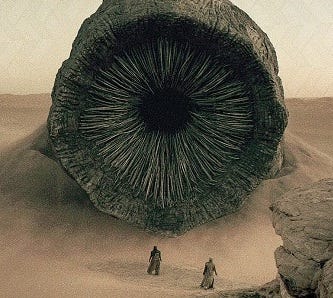I’ve been audiobooking my way through Dune (spoilers by the way) and I’m struck by the importance of ecology to its plot. I already knew about Frank Herbert’s history before starting the book, that his research into restoration attempts of the Oregon Dunes inspired the novel. But Dune goes far beyond the ecological roots I expected.
Everyone in this book is always observing. One of the first moments that struck me was a character observing, watching the citizens of desert planet Arrakis staring at the trees while passing the gate of the city’s palace.
“Those are date palms,” he said. “One date palm requires forty liters of water a day. A man requires but eight liters. A palm, then, equals five men. There are twenty palms out there — one hundred men.”
Water scarcity is everywhere on Arrakis: wells drip and then suddenly run dry, innovative stillsuits and tents are built for its conservation. The culture and religion of the indigenous Fremen is soaked in it: spitting in front of someone is a sign of honor, and crying is a profound gesture, giving “water to the dead.” Drought flows through every place on Arrakis where water does not.
Time is also strange in Dune, not circular with the future feeding into the past but rushing all at once with past, present, and future all boiling to the surface. Chapter epitaphs are penned by Princess Irulan, writing about the man her cousin Paul Atreides would become a generation after the events of the novel. Paul is surrounded by prophecy from the book’s first pages, the past predicting the future, first calling him the Kwisatz Haderach, the shortening of the way, and as soon as the Atreides land on Arrakis, Mahdi, the one who will lead us to paradise.
This collapsing of time only accelerates after Paul gains prescience, the ability to see all possible branching of the future. There are few conflicts in the second half of the novel which Paul, and therefore the reader, haven’t foreseen. We know the plot before it happens: Paul’s victory on Arrakis, his claiming of the empire, his eventual Jihad. This should make Dune a boring read, er, listen.
But ecology replaces plot as the source of mystery and adventure. The mystery of the connection between sandworms and spice drives the book, and as it unravels we accumulate more mysteries: the death of the sandworm and the water of life, the sandtrout and pre-spice deposits, the sandwalkers, the eternal consciousness of the reverend mothers. Endless beautiful connections.

With an ecological focus, the crux of the plot is not whether Paul will reclaim control of Arrakis, but whether the efforts of the Fremen to make the desert flower with their careful stores of water will win out over the extractive thirst for spice of the Atreides, the Harkonnen, the Spacing Guild, the Bene Gesserit, and the Empire. The planet, Arrakis (Dune), is the heart of the novel, not its rulers.
This makes Dune an origin point for a whole subgenre of ecological sci-fi. H. R. Giger’s drawings for Jodorowsky’s Dune adaptation seed the design of Alien’s Xenomorphs. Octavia Butler’s firey California and complicated alien colonialism grows alongside it and the Broken Earth branches from them both. Even Avatar in its anthropocentric failure flails to create an ecology that is its own story. But where Avatar makes a plug-and-play planetwide consciousness to generate empathy, Dune explore a planet with painful limits. Greening Arrakis with non-native Earth plants would come at the expense of the sandworms’ unique ecology, and sandworms themselves are foreign to the planet, though deeper in history. It’s an ecology without simple morality, but with endless beautiful complications.
“I cannot give without taking, I cannot take without—”